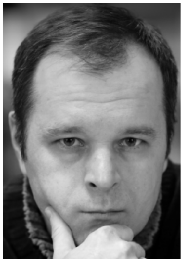ROMAN SENCHIN | ||
 | Roman Senchin was born in 1971 in Kyzyl, capital of what is now the Tuva Republic in East Siberia on the border of Mongolia. He studied at the Literary Institute in Moscow and is a member of the Moscow Writers’ Union. An excerpt: When I move on I almost collide with a procession of local artists. They are not advancing in a flock as they usually do, but walking in single file, each peering at the heels of the person in front as if afraid of losing the trail. Heading the parade is Yura Pikulin, a small, thin man with the face of a boy, but disconcertingly pale and haggard. Three thin bearded individuals follow. Yura bears before him, like the icon in a religious procession, a painting shrouded in a sheet. His eyes are as white as if he were wall-eyed, and fixed sightlessly ahead. Right now it is unlikely that Yura can see any more than the blurred outlines of the Commercial Centre through the fog of a cataclysmic hangover. Assuredly he has not seen me, because he jumps a mile when I ask, “Flogging the picture? He stops, trying to focus, and looks me up and down before croaking, “Yup, there we are... Hello.” The artist following Yura is Shura Reshetov, a lanky man with a long, scrawny beard. He bumps into Yura and obediently stops without saying a word; the others in turn bump into the person in front of them before coming to a halt in a concertinaed column. “You wouldn’t, I don’t suppose... anything to drink?” Yura asks in a parched, suffering voice. “Skint.” I spread my arms. “Not a bent kopek.” Yura gulps, frowns and walks on. Shura, Dima Kovrigin, and Sanya Missing also start up like shunting wagons. I catch up with Yura and fall into step beside him. “What’s the painting?” “Here, look ... We’ve decided to realise ‘The Goddesses of Ganja’.” “What are you doing!” I am genuinely shocked. I know this is Yura’s pride and joy, one of the best things he has painted. “Oh, what the hell!” he frowns again. “A man’s gotta drink.” | |
 | ROMAN SENCHIN MINUS Glas Moscow 2008 ISBN 978-5-7172-0083-7 Buy from Glas 409 Pages
| |
Roman Senchin’s fiction is remarkable for the way it is delving into flat everyday matters when an unexpected space opens out beneath the compacted surface, and for an intellectual seriousness as averse to didacticism as it is to sensational immorality. | ||